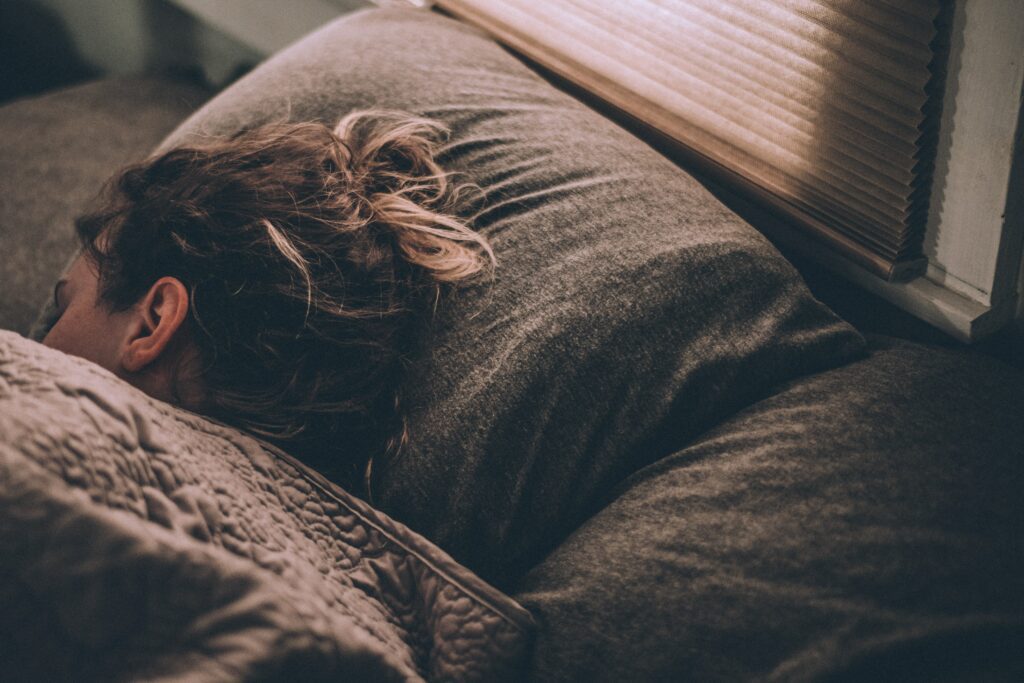I can remember the exact moment when my brain “broke.” At least that’s what it felt like. I became flooded with intense feelings of anxiety that overwhelmed me. I had never felt anything like that before and wondered if I was dying. At the time, I was 13 years old. The feelings were linked to random thoughts about masturbation. I thought, oh my God, am I going to go to hell for having done this? Am I a morally wrong person? What if this means something bad about me? This experience felt completely out of the blue as if my brain had finally made some sort of foreign connection.
Confessing as a compulsion
I immediately felt I needed to confess my thoughts. The first person I saw was my mother, so we had a very awkward conversation together about masturbation despite the topic being taboo in our family. I remember feeling so much better and reassured at that moment. Unfortunately, it wouldn’t last long. That night, I continued to feel a numb, sinking feeling in my gut and the eerie sensation that this “thing” wasn’t going away any time soon.
From that point on my intrusive thoughts and obsessions cycled through a lot of the themes that are commonly spoken about. There were fears of being gay, fears of being attracted to or doing something sexual with family members, fears of being attracted to my dog or wanting to do inappropriate things to pets, fears of being sexually attracted to sexual violence in the media, and fears of being the victim of sexual violence by others. Groinal responses were also present and made things seem that much more real. I was also being bombarded with a lot of obsessions surrounding harm coming to myself or others. I was constantly checking doors to ensure they were locked or making sure that the curling iron was actually off.
I was consumed with all sorts of “what-ifs” and how to prevent anything dangerous that would have potentially been my fault.
I continued to tell my mom all of my fears. There was something about saying them out loud and having her listen to them that made me feel reassured. It made me feel safer like I wasn’t alone in this scary “thing” happening inside my head. It felt like my themes were always trying to “one-up” each other. If sexual images weren’t scary anymore, then what about bestiality thoughts? If that didn’t do the trick, then what about pedophile-themed thoughts (POCD)? Finally, my OCD reached a point where the only situation in which I couldn’t get the reassurance I “needed” was in past events. How could I be 100% certain that I didn’t do something bad in the past if no one was there to witness it? This was my ultimate fear, which I now know as false memory OCD.
OCD wasn’t completely debilitating until the POCD and false memory themes came together. Around that time, as most teenage girls do, I was babysitting children and family friends. Afterward, I was terrorized by the thoughts, what if I molested them? I began a constant cycle of mentally reviewing everything I had done, ruminating on what exactly took place. My fears were generalized to other children I had babysat. I began to avoid watching people’s children and continued to push the thoughts away. The hardest thing I’ve ever done in my life was to confess these dark obsessions to my mother. She did not understand what was happening to her daughter, but doing so allowed me to get help.
Starting therapy
This is when I first started traditional talk therapy. The best thing that came out of this process was that I was given an OCD diagnosis. Finally, I had an answer to this “thing,” but this did not lead to effective treatment. Unfortunately, like so many others, I utilized these sessions for confession and reassurance seeking. My homework was to name all of the good things about myself. I remember clearly thinking, how is this helping me? This therapist had me challenging the thoughts, trying to push them away, labeling the thoughts as “junk thoughts.” Knowing what I know now, this was exactly what I shouldn’t have been doing to treat OCD.
Something I can’t forget is when I told this therapist about the POCD thoughts. I will never forget the look on her face when I brought it up. She questioned me relentlessly, which only led me to feel more doubtful and guilty. I was engulfed in shame. I recall going home and searching online for anything that sounded even remotely similar to my experience. There really wasn’t much at that time. Taboo thoughts were rarely if ever, mentioned when searching for OCD. This was such a difficult time in my life and I know many of you are currently going through this.
It is really sad to say this now, but I remember being so excited to just go to sleep after each day. It was my only escape. When I was asleep in my bed, I didn’t have to worry about the intrusive thoughts that plagued my mind. The thoughts that I hated, and that seemed to torment me all day. I was exhausted both physically and mentally, and I still didn’t fully grasp what I was dealing with.

I never had the desire to commit suicide, but at this point, I could empathize with those who had considered that decision. Socially, I became a different person. I no longer wanted to be around everyone. I became a shell of my former self. I felt like I didn’t deserve even the simplest joys in life. For example, I can remember feeling such guilt and shame when going to the hair salon because I “didn’t deserve” to get pampered or feel good after a haircut. It’s the little things that OCD can take away.
After therapy, I continued with compulsions
I left talk therapy after my sessions were up and continued with my compulsions. Over the years I have suffered from bouts of extreme anxiety. I would push away my thoughts and distract myself. But it was never enough, it would always return. Honestly, I’ve been doing compulsions up until this past year—some of which I never knew were compulsions. New obsessions emerged along with the POCD and false memory obsessions. For example, the fear of having a sexually transmitted disease, the fear of being pregnant, and rumination about past mistakes or social failures.
A couple of months ago, I was sitting with my boyfriend and began randomly googling OCD (something I’m sure many of you are familiar with). I wanted to feel less isolated and alone in my struggles. Randomly, I had the thought, if my boyfriend only knew about my thoughts, about POCD, he would definitely leave me. So there I was, just like my 13-year-old self, scared and looking for any form of reassurance. I felt that familiar pulling feeling to tell him. I needed him to know. I looked up a website about POCD and confessed everything to him. He was shocked and had no idea what to say. He knew I had OCD, but did understand how serious it became.
He told me that he still loved me, but we rarely talk about it to this day. I’m glad we talked about it, I just wish it would have been on my own time and when I was actually ready. To this day, my boyfriend and my mother are the only non-professionals who know about my OCD (to my knowledge).
Finding support
Chrissie Hodges’s YouTube page was a huge help. The first video I watched on her page was about her lived experience with POCD. Having someone who could so openly and vulnerably share their deepest, and most personal, intrusive thoughts and obsessions gave me hope. It helped me to see that I was not alone. So many people in this community have taboo themes but are afraid to speak up (myself included). For instance, I wish I could use my full name in this article and pictures of myself, but I’m just not there yet, and that’s okay. I wish more people would educate themselves on POCD, false memory OCD, real event OCD, and how they can combine. I was actually inspired to tell my story by reading a previous “My Journey” post by NOCD that discussed my themes.
In February 2022 I was introduced to NOCD. I started working with Melanie, my current therapist, in July. This was when I officially started the hard, necessary work of ERP. I can remember being so resistant to exposures, even telling my therapist that I “didn’t think exposures would work for me.” Within 2 months of treatment, I began to feel a noticeable difference. I learned how to sit with anxiety and not run from it. I would have never been able to accept thoughts, feelings, and uncertainty before therapy. Together, we made imaginal scripts (worst-case scenarios) and read them without engaging in compulsions. I learned to feel hard emotions and get through them. My therapist incorporated Acceptance and Commitment Therapy (ACT) into our sessions as well. I began to simply notice a thought and not attach meaning to it. I still attend therapy through NOCD, but I’m now in the maintenance stage. I do exposures on my own time and check in with my therapist to ensure that I get support when needed.
Within 2 months of ERP treatment, I began to feel a noticeable difference.
I didn’t consider OCD to be part of my identity until this past year. I am 25 years old now. Before this, I just looked back on my experience as this horrible thing that happened when I was 13. But OCD has shaped me into the person I am today. Would I cure it if I could? Absolutely. But since I can’t, I have learned to accept that this is a part of me.

The OCD community needs to come together to talk more openly about taboo themes. These themes are far more common than anyone realizes and people are suffering in silence. Hearing others talk about their experiences can save lives. I wish my 13-year-old self could have learned about it sooner. I wish she could have been a part of the OCD community that I have today.
There isn’t a day that goes by when I don’t think about OCD. It’s always going to be there. It has taken time, but I’ve accepted that. Of course, I have really bad days and really good days too. That’s okay. You just have to keep going and trust that you’re not alone.

